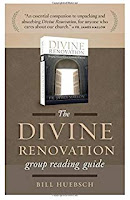Early on a Saturday morning, a middle-aged pastor was on the
golf course preparing to tee off. (Since I don’t golf, you know the story’s not
about me!) He was playing alone so he was glad when a stranger asked if he
could join him for the round.
After they’d finished 18 holes, the stranger said, “I really
enjoyed playing with you. Would you like to join me again tomorrow morning?”
The pastor replied, “I’m sorry, I can’t. I work on Sunday
mornings.” Puzzled, the stranger asked, “What on earth do you do on Sunday
mornings?” To which the pastor replied, “You know, I’ve been asking myself that
question for years.”
I can tell you one thing about that pastor’s parish: the
parishioners don’t know what they’re
doing on Sunday mornings, either. Because we all need to know what we are doing at Mass if this community is
truly to be what God wants it to be.
There’s no secret what that is. The Book of Revelation tells
us today in language that’s both glorious and perfectly clear: Jesus “made us
to be a kingdom, priests serving his God and Father.”
There in a dozen words is my identity, your identity, and
the identity of this Eucharistic assembly. We are called to be a kingdom of
priests. It’s not even something new, because even in the Book of Exodus the
Lord tells Moses, “the whole earth is mine, but you shall be for me a priestly
kingdom and a holy nation”.
So we’re not only a people ruled by a king, the Lord, but
also a royal people called to reign with him (cf. Peter S. Williamson, Revelation, p. 47).
We celebrate Christ’s unique kingship on the Solemnity of
Christ the King—both the Responsorial Psalm and the Gospel invite us to be his
loyal subjects. But on our parish Feast Day, the readings also point us to the
wonderful truth that “we will also reign with him” (cf. 2 Timothy 2:12).
Thus, the kingship of Christ has enormous consequences for
each and every Christian, because we have a share in it. Here’s what the Catechism
says: “Jesus Christ is the one whom the Father anointed with the Holy Spirit
and established as priest, prophet, and king. The whole People of God
participates in these three offices of Christ and bears the responsibilities
for mission and service that flow from them.” (CCC, 783)
We cannot speak of the kingship of Jesus without speaking of
the kingdom. Even to scholars, it’s a mysterious concept and yet Jesus gave the
kingdom of God the first place in his preaching. If you open your Bible to the
first pages of St. Matthew, you will find that he begins his ministry with the
words, “repent, for the kingdom of Heaven has come near.” In Mark, the Lord’s
first words are “the time is fulfilled and the kingdom of God has come near.”
Isn’t it obvious that the Kingdom of God demands our
attention? Not just this Sunday but every day. We can’t celebrate Christ the King without celebrating the
kingdom of Christ. And we need to celebrate the kingdom of Christ as our inheritance
and our destiny. Speaking in some sense to all of us, Jesus promised the
apostles at the Last Supper “I confer on you, just as my Father has conferred
on me, a kingdom.”
Many of us speak easily of ‘going to Mass’. How wonderful it
would be if we could find a nobler way to describe what we do on Sunday!
Although the ministerial priesthood differs essentially from the common
priesthood of all the faithful, we all exercise our royal priesthood at Mass.
Jesus did not say, “do this in memory of me” only to the ordained priest, but
to all of us. We obey his command together.
In the same way, since Jesus also gave us a share in his
kingship, we exercise that together. How do we do that? The same way he does: by
serving others. As Fr. John Jay Hughes writes, “A religion that is limited to
obtaining blessings for ourselves with few consequences in daily life, is not
the religion of Jesus Christ.”
Our parish community embraces Christ’s mission with energy
and generosity. We serve the poor, prisoners, the young and the old. Our strong
commitment to evangelization is nothing less than a commitment to building God’s
kingdom on earth. Dedicated to Christ
the Redeemer, our parish offers Christ’s sacrifice for the redemption of all
God’s children.
We celebrate all of this today as we gather to worship and honour
Our Lord Jesus Christ, the King of the Universe. It’s no accident that this
solemn feast ends our liturgical year and points us to the day when he will return
at the end of time. As members of a ‘royal nation of priests’ we are called to
live amid the darkness of our world in the light of what we heard in the second
reading: “Look! He is coming with the clouds; every eye will see him, even
those who pierced him.”
Today let’s look at the big picture of Christ the Redeemer
Parish. Last night’s Feast Day Fiesta had to be one of the most delightful parish
events in our history—and not just because we got to see Father Giovanni
dressed like the lead guitarist in a mariachi band. Last evening gathered us
together as a family, as friends, and as a community. It surely strengthened
the bonds that unite us.
But as we gather for Mass, we go deeper still and ask “what
on earth are we doing on Sunday mornings?” We are a family of faith, to be
sure. But we’re much more; we’re a kingdom of priests, serving our God and
Father as we give him glory in this Eucharist, building his kingdom together as
we serve our brothers and sisters in love.








